- Home
- Truman Capote
Breakfast at Tiffany's Page 3
Breakfast at Tiffany's Read online
Page 3
“Why are you crying?”
She sprang back, sat up. “Oh, for God’s sake,” she said, starting for the window and the fire escape, “I hate snoops.”
THE NEXT DAY, FRIDAY, I came home to find outside my door a grand-luxe Charles & Co. basket with her card: Miss Holiday Golightly, Traveling: and scribbled on the back in a freakishly awkward, kindergarten hand: Bless you darling Fred. Please forgive the other night. You were an angel about the whole thing. Mille tendresse—Holly. P.S. I won’t bother you again. I replied, Please do, and left this note at her door with what I could afford, a bunch of street-vendor violets. But apparently she’d meant what she said; I neither saw nor heard from her, and I gathered she’d gone so far as to obtain a downstairs key. At any rate she no longer rang my bell. I missed that; and as the days merged I began to feel toward her certain far-fetched resentments, as if I were being neglected by my closest friend. A disquieting loneliness came into my life, but it induced no hunger for friends of longer acquaintance: they seemed now like a salt-free, sugarless diet. By Wednesday thoughts of Holly, of Sing Sing and Sally Tomato, of worlds where men forked over fifty dollars for the powder room, were so constant that I couldn’t work. That night I left a message in her mailbox: Tomorrow is Thursday. The next morning rewarded me with a second note in the play-pen script: Bless you for reminding me. Can you stop for a drink tonight 6-ish?
I waited until ten past six, then made myself delay five minutes more.
A creature answered the door. He smelled of cigars and Knize cologne. His shoes sported elevated heels; without these added inches, one might have taken him for a Little Person. His bald freckled head was dwarf-big: attached to it were a pair of pointed, truly elfin ears. He had Pekingese eyes, unpitying and slightly bulged. Tufts of hair sprouted from his ears, from his nose; his jowls were gray with afternoon beard, and his handshake almost furry.
“Kid’s in the shower,” he said, motioning a cigar toward a sound of water hissing in another room. The room in which we stood (we were standing because there was nothing to sit on) seemed as though it were being just moved into; you expected to smell wet paint. Suitcases and unpacked crates were the only furniture. The crates served as tables. One supported the mixings of a martini; another a lamp, a Libertyphone, Holly’s red cat and a bowl of yellow roses. Bookcases, covering one wall, boasted a half-shelf of literature. I warmed to the room at once, I liked its fly-by-night look.
The man cleared his throat. “You expected?”
He found my nod uncertain. His cold eyes operated on me, made neat, exploratory incisions. “A lot of characters come here, they’re not expected. You know the kid long?”
“Not very.”
“So you don’t know the kid long?”
“I live upstairs.”
The answer seemed to explain enough to relax him. “You got the same layout?”
“Much smaller.”
He tapped ash on the floor. “This is a dump. This is unbelievable. But the kid don’t know how to live even when she’s got the dough.” His speech had a jerky metallic rhythm, like a teletype. “So,” he said, “what do you think: is she or ain’t she?”
“Ain’t she what?”
“A phony.”
“I wouldn’t have thought so.”
“You’re wrong. She is a phony. But on the other hand you’re right. She isn’t a phony because she’s a real phony. She believes all this crap she believes. You can’t talk her out of it. I’ve tried with tears running down my cheeks. Benny Polan, respected everywhere, Benny Polan tried. Benny had it on his mind to marry her, she don’t go for it, Benny spent maybe thousands sending her to head-shrinkers. Even the famous one, the one can only speak German, boy, did he throw in the towel. You can’t talk her out of these”—he made a fist, as though to crush an intangible—“ideas. Try it sometime. Get her to tell you some of the stuff she believes. Mind you,” he said, “I like the kid. Everybody does, but there’s lots that don’t. I do. I sincerely like the kid. I’m sensitive, that’s why. You’ve got to be sensitive to appreciate her: a streak of the poet. But I’ll tell you the truth. You can beat your brains out for her, and she’ll hand you horseshit on a platter. To give an example—who is she like you see her today? She’s strictly a girl you’ll read where she ends up at the bottom of a bottle of Seconals. I’ve seen it happen more times than you’ve got toes: and those kids, they weren’t even nuts. She’s nuts.”
“But young. And with a great deal of youth ahead of her.”
“If you mean future, you’re wrong again. Now a couple of years back, out on the Coast, there was a time it could’ve been different. She had something working for her, she had them interested, she could’ve really rolled. But when you walk out on a thing like that, you don’t walk back. Ask Luise Rainer. And Rainer was a star. Sure, Holly was no star; she never got out of the still department. But that was before The Story of Dr. Wassell. Then she could’ve really rolled. I know, see, cause I’m the guy was giving her the push.” He pointed his cigar at himself. “O.J. Berman.”
He expected recognition, and I didn’t mind obliging him, it was all right by me, except I’d never heard of O.J. Berman. It developed that he was a Hollywood actor’s agent.
“I’m the first one saw her. Out at Santa Anita. She’s hanging around the track every day. I’m interested: professionally. I find out she’s some jock’s regular, she’s living with the shrimp. I get the jock told Drop It if he don’t want conversation with the vice boys: see, the kid’s fifteen. But stylish: she’s okay, she comes across. Even when she’s wearing glasses this thick; even when she opens her mouth and you don’t know if she’s a hillbilly or an Okie or what. I still don’t. My guess, nobody’ll ever know where she came from. She’s such a goddamn liar, maybe she don’t know herself any more. But it took us a year to smooth out that accent. How we did it finally, we gave her French lessons: after she could imitate French, it wasn’t so long she could imitate English. We modeled her along the Margaret Sullavan type, but she could pitch some curves of her own, people were interested, big ones, and to top it all, Benny Polan, a respected guy, Benny wants to marry her. An agent could ask for more? Then wham! The Story of Dr. Wassell. You see that picture? Cecil B. DeMille. Gary Cooper. Jesus. I kill myself, it’s all set: they’re going to test her for the part of Dr. Wassell’s nurse. One of his nurses, anyway. Then wham! The phone rings.” He picked a telephone out of the air and held it to his ear. “She says, this is Holly, I say honey, you sound far away, she says I’m in New York, I say what the hell are you doing in New York when it’s Sunday and you got the test tomorrow? She says I’m in New York cause I’ve never been to New York. I say get your ass on a plane and get back here, she says I don’t want it. I say what’s your angle, doll? She says you got to want it to be good and I don’t want it, I say well, what the hell do you want, and she says when I find out you’ll be the first to know. See what I mean: horseshit on a platter.”
The red cat jumped off its crate and rubbed against his leg. He lifted the cat on the toe of his shoe and gave him a toss, which was hateful of him except he seemed not aware of the cat but merely his own irritableness.
“This is what she wants?” he said, flinging out his arms. “A lot of characters they aren’t expected? Living off tips. Running around with bums. So maybe she could marry Rusty Trawler? You should pin a medal on her for that?”
He waited, glaring.
“Sorry, I don’t know him.”
“You don’t know Rusty Trawler, you can’t know much about the kid. Bad deal,” he said, his tongue clucking in his huge head. “I was hoping you maybe had influence. Could level with the kid before it’s too late.”
“But according to you, it already is.”
He blew a smoke ring, let it fade before he smiled; the smile altered his face, made something gentle happen. “I could get it rolling again. Like I told you,” he said, and now it sounded true, “I sincerely like the kid.”
“What scandals are
you spreading, O.J.?” Holly splashed into the room, a towel more or less wrapped round her and her wet feet dripping footmarks on the floor.
“Just the usual. That you’re nuts.”
“Fred knows that already.”
“But you don’t.”
“Light me a cigarette, darling,” she said, snatching off a bathing cap and shaking her hair. “I don’t mean you, O.J. You’re such a slob. You always nigger-lip.”
She scooped up the cat and swung him onto her shoulder. He perched there with the balance of a bird, his paws tangled in her hair as if it were knitting yarn; and yet, despite these amiable antics, it was a grim cat with a pirate’s cutthroat face; one eye was gluey-blind, the other sparkled with dark deeds.
“O.J. is a slob,” she told me, taking the cigarette I’d lighted. “But he does know a terrific lot of phone numbers. What’s David O. Selznick’s number, O.J.?”
“Lay off.”
“It’s not a joke, darling. I want you to call him up and tell him what a genius Fred is. He’s written barrels of the most marvelous stories. Well, don’t blush, Fred: you didn’t say you were a genius, I did. Come on, O.J. What are you going to do to make Fred rich?”
“Suppose you let me settle that with Fred.”
“Remember,” she said, leaving us, “I’m his agent. Another thing: if I holler, come zipper me up. And if anybody knocks, let them in.”
A multitude did. Within the next quarter-hour a stag party had taken over the apartment, several of them in uniform. I counted two Naval officers and an Air Force colonel; but they were outnumbered by graying arrivals beyond draft status. Except for a lack of youth, the guests had no common theme, they seemed strangers among strangers; indeed, each face, on entering, had struggled to conceal dismay at seeing others there. It was as if the hostess had distributed her invitations while zigzagging through various bars; which was probably the case. After the initial frowns, however, they mixed without grumbling, especially O.J. Berman, who avidly exploited the new company to avoid discussing my Hollywood future. I was left abandoned by the bookshelves; of the books there, more than half were about horses, the rest baseball. Pretending an interest in Horseflesh and How to Tell It gave me sufficiently private opportunity for sizing Holly’s friends.
Presently one of these became prominent. He was a middle-aged child that had never shed its baby fat, though some gifted tailor had almost succeeded in camouflaging his plump and spankable bottom. There wasn’t a suspicion of bone in his body; his face, a zero filled in with pretty miniature features, had an unused, a virginal quality: it was as if he’d been born, then expanded, his skin remaining unlined as a blown-up balloon, and his mouth, though ready for squalls and tantrums, a spoiled sweet puckering. But it was not appearance that singled him out; preserved infants aren’t all that rare. It was, rather, his conduct; for he was behaving as though the party were his: like an energetic octopus, he was shaking martinis, making introductions, manipulating the phonograph. In fairness, most of his activities were dictated by the hostess herself: Rusty, would you mind; Rusty, would you please. If he was in love with her, then clearly he had his jealousy in check. A jealous man might have lost control, watching her as she skimmed around the room, carrying her cat in one hand but leaving the other free to straighten a tie or remove lapel lint; the Air Force colonel wore a medal that came in for quite a polish.
The man’s name was Rutherfurd (“Rusty”) Trawler. In 1908 he’d lost both his parents, his father the victim of an anarchist and his mother of shock, which double misfortune had made Rusty an orphan, a millionaire, and a celebrity, all at the age of five. He’d been a stand-by of the Sunday supplements ever since, a consequence that had gathered hurricane momentum when, still a schoolboy, he had caused his godfather-custodian to be arrested on charges of sodomy. After that, marriage and divorce sustained his place in the tabloid-sun. His first wife had taken herself, and her alimony, to a rival of Father Divine’s. The second wife seems unaccounted for, but the third had sued him in New York State with a full satchel of the kind of testimony that entails. He himself divorced the last Mrs. Trawler, his principal complaint stating that she’d started a mutiny aboard his yacht, said mutiny resulting in his being deposited on the Dry Tortugas. Though he’d been a bachelor since, apparently before the war he’d proposed to Unity Mitford, at least he was supposed to have sent her a cable offering to marry her if Hitler didn’t. This was said to be the reason Winchell always referred to him as a Nazi; that, and the fact that he attended rallies in Yorkville.
I was not told these things. I read them in The Baseball Guide, another selection off Holly’s shelf which she seemed to use for a scrapbook. Tucked between the pages were Sunday features, together with scissored snippings from gossip columns. Rusty Trawler and Holly Golightly two-on-the-aisle at “One Touch of Venus” preem. Holly came up from behind, and caught me reading: Miss Holiday Golightly, of the Boston Golightlys, making every day a holiday for the 24-karat Rusty Trawler.
“Admiring my publicity, or are you just a baseball fan?” she said, adjusting her dark glasses as she glanced over my shoulder.
I said, “What was this week’s weather report?”
She winked at me, but it was humorless: a wink of warning, “I’m all for horses, but I loathe baseball,” she said, and the sub-message in her voice was saying she wished me to forget she’d ever mentioned Sally Tomato. “I hate the sound of it on a radio, but I have to listen, it’s part of my research. There’re so few things men can talk about. If a man doesn’t like baseball, then he must like horses, and if he doesn’t like either of them, well, I’m in trouble anyway: he don’t like girls. And how are you making out with O.J.?”
“We’ve separated by mutual agreement.”
“He’s an opportunity, believe me.”
“I do believe you. But what have I to offer that would strike him as an opportunity?”
She persisted. “Go over there and make him think he isn’t funny-looking. He really can help you, Fred.”
“I understand you weren’t too appreciative.” She seemed puzzled until I said: “The Story of Doctor Wassell.”
“He’s still harping?” she said, and cast across the room an affectionate look at Berman. “But he’s got a point, I should feel guilty. Not because they would have given me the part or because I would have been good: they wouldn’t and I wouldn’t. If I do feel guilty, I guess it’s because I let him go on dreaming when I wasn’t dreaming a bit. I was just vamping for time to make a few self-improvements: I knew damn well I’d never be a movie star. It’s too hard; and if you’re intelligent, it’s too embarrassing. My complexes aren’t inferior enough: being a movie star and having a big fat ego are supposed to go hand-in-hand; actually, it’s essential not to have any ego at all. I don’t mean I’d mind being rich and famous. That’s very much on my schedule, and someday I’ll try to get around to it; but if it happens, I’d like to have my ego tagging along. I want to still be me when I wake up one fine morning and have breakfast at Tiffany’s. You need a glass,” she said, noticing my empty hands. “Rusty! Will you bring my friend a drink?”
She was still hugging the cat. “Poor slob,” she said, tickling his head, “poor slob without a name. It’s a little inconvenient, his not having a name. But I haven’t any right to give him one: he’ll have to wait until he belongs to somebody. We just sort of took up by the river one day, we don’t belong to each other: he’s an independent, and so am I. I don’t want to own anything until I know I’ve found the place where me and things belong together. I’m not quite sure where that is just yet. But I know what it’s like.” She smiled, and let the cat drop to the floor. “It’s like Tiffany’s,” she said. “Not that I give a hoot about jewelry. Diamonds, yes. But it’s tacky to wear diamonds before you’re forty; and even that’s risky. They only look right on the really old girls. Maria Ouspenskaya. Wrinkles and bones, white hair and diamonds: I can’t wait. But that’s not why I’m mad about Tiffany’s. Listen. You know
those days when you’ve got the mean reds?”
“Same as the blues?”
“No,” she said slowly. “No, the blues are because you’re getting fat or maybe it’s been raining too long. You’re sad, that’s all. But the mean reds are horrible. You’re afraid and you sweat like hell, but you don’t know what you’re afraid of. Except something bad is going to happen, only you don’t know what it is. You’ve had that feeling?”
“Quite often. Some people call it angst.”
“All right. Angst. But what do you do about it?”
“Well, a drink helps.”
“I’ve tried that. I’ve tried aspirin, too. Rusty thinks I should smoke marijuana, and I did for a while, but it only makes me giggle. What I’ve found does the most good is just to get into a taxi and go to Tiffany’s. It calms me down right away, the quietness and the proud look of it; nothing very bad could happen to you there, not with those kind men in their nice suits, and that lovely smell of silver and alligator wallets. If I could find a real-life place that made me feel like Tiffany’s, then I’d buy some furniture and give the cat a name. I’ve thought maybe after the war, Fred and I—” She pushed up her dark glasses, and her eyes, the differing colors of them, the grays and wisps of blue and green, had taken on a far-seeing sharpness. “I went to Mexico once. It’s wonderful country for raising horses. I saw one place near the sea. Fred’s good with horses.”
Rusty Trawler came carrying a martini; he handed it over without looking at me. “I’m hungry,” he announced, and his voice, retarded as the rest of him, produced an unnerving brat-whine that seemed to blame Holly. “It’s seven-thirty, and I’m hungry. You know what the doctor said.”
“Yes, Rusty. I know what the doctor said.”

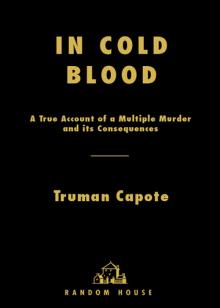 In Cold Blood
In Cold Blood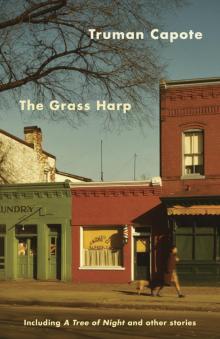 The Grass Harp, Including a Tree of Night and Other Stories
The Grass Harp, Including a Tree of Night and Other Stories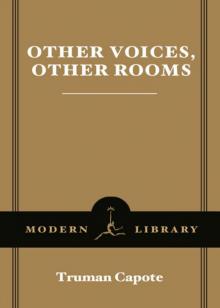 Other Voices, Other Rooms
Other Voices, Other Rooms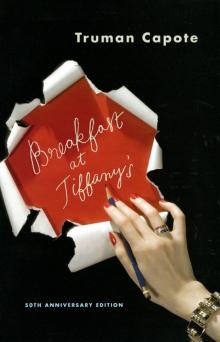 Breakfast at Tiffany's
Breakfast at Tiffany's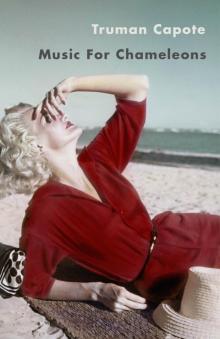 Music For Chameleons
Music For Chameleons A Christmas Memory, Including One Christmas and the Thanksgiving Visitor
A Christmas Memory, Including One Christmas and the Thanksgiving Visitor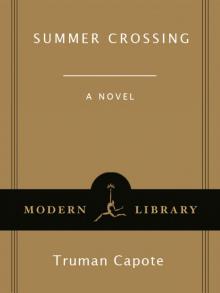 Summer Crossing
Summer Crossing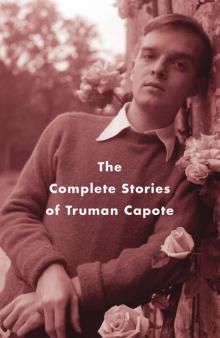 The Complete Stories of Truman Capote
The Complete Stories of Truman Capote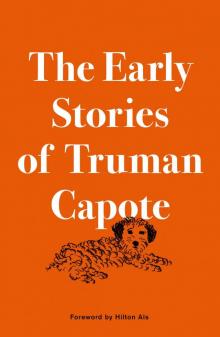 The Early Stories of Truman Capote
The Early Stories of Truman Capote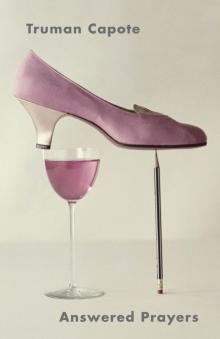 Answered Prayers
Answered Prayers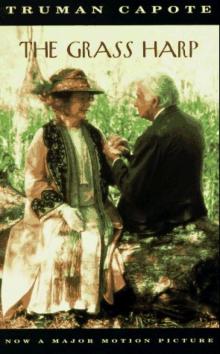 The Grass Harp
The Grass Harp SSC (2004) The Complete Stories of Truman Capote
SSC (2004) The Complete Stories of Truman Capote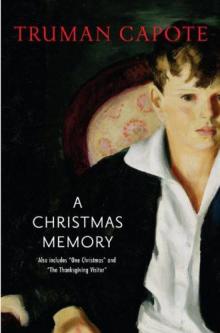 A Christmas Memory
A Christmas Memory